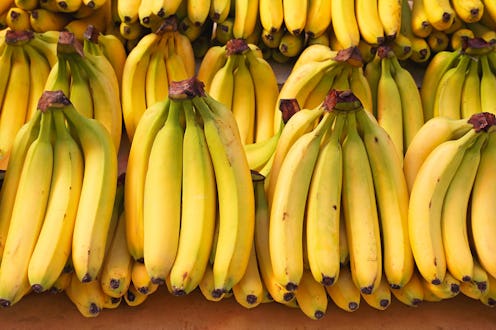
If you are a lover of banana bread, strawberry banana smoothies, banana split sundaes, or just plain ol' bananas, I have some bad news for you: A particular type of banana might be going extinct because of a fungus called Tropical Race 4, which causes an untreatable disease when contracted by our favorite yellow fruit. The disease, called Panama disease, once wreaked large-scale havoc like this in the 1960s when it nearly drove bananas in Costa Rica and Panama to extinction. Finally in the 1980s, researchers were able to isolate the fungus doing all the damage — but scientists are now predicting that it will be responsible for destroying bananas all over the world.
According to Quartz, Tropical Race 4 specifically targets Cavendish bananas. That's extra bad news, because these bananas are the world' s most popular eating banana — that is, they're the kind people commonly use in banana cream pie, banana muffins, banana pudding, and just as snacks all on their own. The fungus has already reached nearly every continent, destroying banana plantations in South Asia, Australia, China, the Philippines, Jordan, Mozambique, Pakistan, the Middle East, and parts of Africa.
While this certainly means we'll have to find a different source of potassium and a different, phallic fruit on which to do condom demonstrations (maybe the eggplant is a viable option?), things are significantly worse off for small-time banana farmers in poor countries where the fruit is a primary export and source of income. Just like the worldwide chocolate shortage, those doing the growing are getting hit the hardest.
Bananas are particularly susceptible to extinction because they don't reproduce sexually. (Stop laughing. I mean it.) This means that, over time, they can't evolve to build defenses against predators and infections that might wipe them out. But is there hope, at the end of the day? Unfortunately, not really. According to Quartz, last time this happened in the 1960s, the commercial banana crop of that time, the Gros Michel, went extinct. We will either need to make drastic changes to banana farming (which is expensive and requires a lot of time) or settle for another strain.
Basically, get 'em while you can, folks.
Images: Anjana Sharma/Getty Images; Giphy